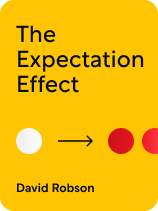

This article is an excerpt from the Shortform book guide to "The Expectation Effect" by David Robson. Shortform has the world's best summaries and analyses of books you should be reading.
Like this article? Sign up for a free trial here.
What’s your general attitude toward aging? Are you scared of getting older? Do you assume your body will fall apart?
Many people are afraid of the side effects of getting older, such as developing health issues. But the more you think about it, the more likely these things will happen.
Continue reading to learn how your attitude toward aging affects your health in the future.
Change What You Think About Aging
Expectation effects can influence your attitude toward aging and how long you live—that’s how powerful your beliefs about aging are. In The Expectation Effect, David Robson reports that your expectations about aging might be just as important as your actual age in determining your well-being. People with negative attitudes toward aging—like expecting to experience illness and frailty with age—are more likely to develop heart problems and stroke. Conversely, people with positive attitudes about aging—like higher expectations for the energy level and usefulness they’ll feel as they age—seem to have a lower risk for some types of dementia.
(Shortform note: Researchers have long thought that your subjective age—the age you feel you are—plays an important role in your well-being as you get older because an optimistic outlook can help you experience age-related changes more positively. Some experts think we should focus on aging better rather than living longer, as not everyone agrees with Robson that it’s possible to extend our lifespans. For instance, In Why We Get Sick, Randolph Nesse and George Williams explain that many biological forces—like the wear and tear on our bodies and the declining effectiveness of our repair systems—work against the goal of increasing our lifespans. So they think that delaying aging and staying healthy longer are more realistic goals.)
To age better and live longer, Robson recommends adopting a few strategies:
1. Focus on the Benefits of Getting Older
First, Robson advises against fixating on what you’ll lose by leaving your youth behind; instead, focus on all you’ll gain by living a long life. Studies show that maintaining a healthy lifestyle as you age can help your body to stay resilient, and your mindset is an integral part of that.
(Shortform note: Robson isn’t the first to suggest that your focus should change as you age. Researchers have found that over our lifetimes, we tend to shift from a “promotion motivation”—seeing our goals in terms of what we want to gain or how we can improve the status quo—to a “prevention motivation”—seeing our goals in terms of avoiding loss and keeping things moving smoothly. That means that “happiness” looks different as you get older: Younger people might want to feel excited while older people want to feel peaceful. Experts say that both are valid and reflect how our focus can and should change if we’re lucky enough to live a long life.)
2. Don’t Let Others Tell You That You Can’t Do Something
Next, reject messages that tell you you’re too old to do something. Robson advises questioning the factual evidence for these messages. While negative stereotypes about aging are everywhere, you can think critically about them and counteract them by seeking out positive role models who didn’t slow down when society told them to.
(Shortform note: Though stereotypes position aging as an inevitable loss of health and vitality, experts say that the aging process—like the brain—is plastic. You have control over how you age: Choices like alcohol and tobacco use, physical activity, and cognitive engagement account for as much as 70% of the variance in age-related changes to cognition. You don’t have to accept that you’re “too old” to do something just because someone else says so.)
3. Diversify Your Friend Group
Finally, Robson recommends cultivating friendships with people of different ages. This can improve your expectations of what life will be like as you get older.
(Shortform note: Experts have identified many great reasons to start cultivating friendships outside of your current circle. Researchers explain that intergenerational friendships can make you smarter, more resilient, and more open-minded. Plus, in Who Will Cry When You Die?, Robin Sharma notes that building new friendships not only helps you feel supported but also adds new sources of joy to your life.)

———End of Preview———
Like what you just read? Read the rest of the world's best book summary and analysis of David Robson's "The Expectation Effect" at Shortform.
Here's what you'll find in our full The Expectation Effect summary:
- Why you should rely on your body, not the universe, to make you happier
- How your brain can control your health, longevity, and quality of life
- Why you should focus on the benefits of getting older, rather than fearing it






